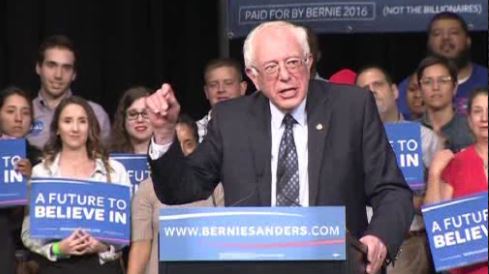By CATHERINE LUCEY and LISA LERER
Associated Press
DES MOINES, Iowa (AP) – For Bernie and Jane Sanders, the revolution continues, despite the odds.
The Vermont senator’s insurgent campaign seems on its last legs. With a clear delegate lead, Hillary Clinton has turned her focus to the general election and presumptive Republican nominee Donald Trump. Sanders’ fundraising has dropped off and he has shed hundreds of staffers. Even President Barack Obama is noting the realities of the delegate math.
But in Atlantic City on Monday, Sanders urged his supporters to keep fighting.
"If we can win here in New Jersey and win in California and win in some of the other states and if we can win a majority of the pledged delegates, we’re going to go into Philadelphia and the Democratic convention and expect to come out with the Democratic nomination," Sanders said.
That’s a lot of ifs. Sanders is trailing Clinton by nearly 300 pledged delegates – those won in primaries and caucuses. As well, Clinton holds a commanding lead among superdelegates, the elected officials and party leaders who can support the candidate of their choice. That leaves her only 155 delegates short of the 2,383 she needs to secure the nomination.
Sanders clings to the hope he can erase the gap with pledged delegates by winning a string of victories, starting with West Virginia on Tuesday, Kentucky and Oregon on May 17 and California and New Jersey on June 7.
Sanders continues to draw large enthusiastic crowds to his rallies. But his fundraising has dipped and his advertising has dropped off a cliff, with only about $525,000 in ads planned for the giant state of California and $63,000 each in West Virginia and Oregon, according to advertising tracker Kantar Media’s CMAG.
Still, Jane Sanders, a top adviser to her husband, disputed that the campaign was running out of options in an interview Friday. She said superdelegates could switch their commitments, suggesting that they should consider the results in their home states. She also argued that Sanders has shown momentum and polls well against Trump.
"We understand that the path is narrowing now, but there is a path," Jane Sanders said. "There have been a lot of surprises. We saw a Michigan miracle and Indiana no one expected."
Asked about the mathematical odds and what comes next, she expressed frustration with the media, saying "there was never once a point when anyone said he could possibly win," even after he won eight states in a row. "For one full year," she said of the perception, "it’s been consistent that he doesn’t have a chance."
With a clear Republican opponent in sight, Clinton has called on Democrats to unite around her candidacy to help take on Trump. Campaigning recently in California, she argued that her advantage over Sanders far outpaces the deficit she faced against Barack Obama in the 2008 primaries.
Just how the Democratic rivals reach detente is not yet clear, partly because Bernie Sanders has not fully said what he is looking for. He is arguing for a say in the party platform at the convention, but that issue is far from resolved.
"We’re still competing for the nomination," said senior adviser Tad Devine. "Having said that. It’s really important that the views of the millions of people who have supported him be expressed."
Sanders put the Democratic National Committee on notice Friday, warning them not to stack the convention’s standing committees with Clinton supporters. Sanders said if the party is going to be unified in the fall, it can’t have a convention at which the views of millions of people are "unrepresented" in the committee membership.
Obama hasn’t been shy about revealing this personal preference for Clinton, but he’s been careful not to be seen acting on the bias. Obama sees his role in the primary as that of a unifier. When it’s time, the White House believes he has the ability to coax some die-hard Sanders’ fans into the Clinton camp – particularly young people and liberals. But if he moves too early, and angers those voters, he risks undermining that effort.
White House officials have said aides may privately act as liaisons between the campaigns, but publicly the president will probably be sidelined until Sanders gets out or Clinton wins enough delegates to claim presumptive status.
___
Associated Press writers Kathleen Hennessey, Ken Thomas and Julie Bykowicz contributed to this report from Washington.
Copyright 2016 The Associated Press. All rights reserved. This material may not be published, broadcast, rewritten or redistributed.

